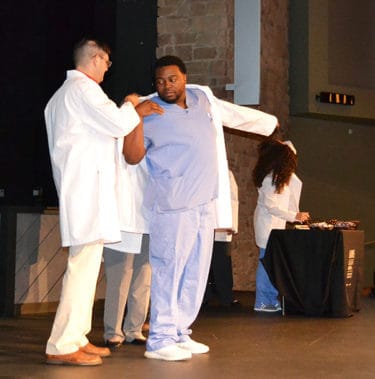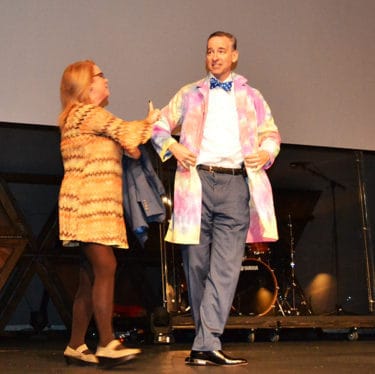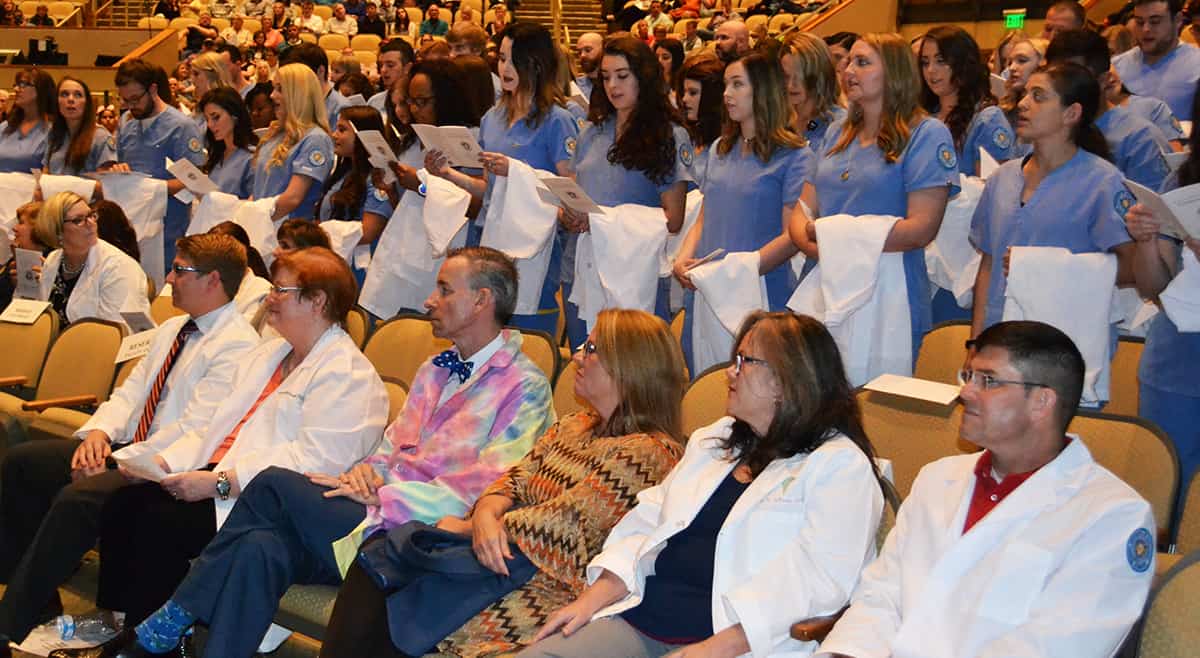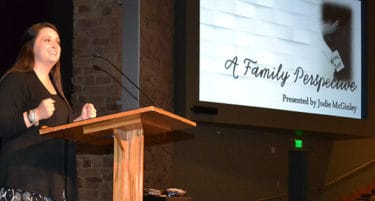Junior BSN Students Don Their White Coats
| Jodie McGinley shared a life lesson with the 118 UAMS College of Nursing juniors gathered Oct. 12 for a White Coat Ceremony marking their passage into the clinical phase of their education.

A UAMS College of Nursing junior gets help putting on his white coat from members of the college’s faculty.
Using the metaphor of an oxygen mask dropping down in a depressurizing airliner, she said, “You have to mask yourself first. If you don’t, you won’t be able to care for the people beside you. If you are not eating well, if you are not sleeping well, then you will never be able to care for the patients and family just like mine that come into your life as a nurse. Please mask yourself first.”
McGinley, who lost one of her twin sons shortly after his birth, was there as a guest speaker to provide the college’s Class of 2020 with a patient perspective on nursing.
Beforehand, the 118 students navigated through groups of family and friends to their seats in the front of the auditorium at Fellowship Bible Church, and the college’s faculty, staff, alumni and supporters made up the more than 300 audience members.
“The White Coat Ceremony emphasizes the importance of providing high-quality, compassionate care to all people,” said Patricia Cowan, Ph.D., R.N., dean of the college. “Students, as you begin your clinical experience, your white coat serves as a visible symbol of your commitment to provide humane care to all individuals throughout your nursing career.”
Mark Tanner, D.N.P., R.N., the college’s baccalaureate program director, spoke to the audience before introducing Michael Manley, M.S.N., the UAMS Medical Center’s director of clinical services integration and development and a 1990 graduate of the college.

Michael Manley, M.S.N., adds some levity to the White Coat Ceremony by putting on a multicolored ‘white coat.’
Manley recounted his experience as a student and lamented the fact that white coat ceremonies weren’t done when he was a junior.
“I didn’t get this white coat ceremony,” he said. “You know what, I want my own ceremony. Is that OK?”
With some help, Manley proceeded to put on what had been a clinical white coat but was now tie-dyed in a rainbow of colors.
“This is what your white coat is going to look like after 30 years,” Manley said. “You see all these colors. All these colors are everyone I met, all the friends I made as a nurse. They are every patient I’ve ever taken care of, whether it was working in organ transplantation or in an ICU. It may look white on the outside, but it’ll look like this to you if you grab every moment. That’s how you will make changes.”
Next, the class of 2020 was led in recitation of the Nightingale Pledge by Austin Brown, the BSN program’s student government president. The pledge — named in honor of Florence Nightingale, the founder of modern nursing — is a statement of ethics and principles of the nursing profession. Then, students were individually called to the stage to slip into their white coats. Audience members cheered and applauded as each student walked across the stage and donned the white coat with help from two College of Nursing faculty members.
After putting on their white coats, the students each signed an affirmation of the Nightingale Pledge before making another circuit around the rows to rejoin their seated classmates.
Once all the class was seated again, now all wearing white coats, McGinley took the stage to tell the audience how important nurses were to her and her young family almost a decade before.
The first two children born to her and her husband were twin boys. One of them, Eli, had spina bifida, which had been diagnosed before his birth. A surgical team was ready to operate on Eli to help correct the birth defect, but after a pre-surgical briefing, it was a nurse practitioner who took her and her husband aside to fully explain the medical condition of their son
She showed the McGinleys that much of Eli’s brain was absent.
“Things did not turn out how we wanted, but a nurse practitioner made all the difference for us,” McGinley said. “Had she not pulled us aside, we would have a son at home on a machine because we didn’t know. Nursing is not always easy. It’s not butterflies and cupcakes. I can’t imagine what she felt that day.”
Instead of surgery for Eli, the McGinleys chose to withdraw breathing support and donate his organs. When support was removed, Eli surprised everyone by continuing to breathe for 31 more hours.
Eli was at Arkansas Children’s Hospital, and his twin brother, Walker, was in the neonatal intensive care unit (NICU) at UAMS for a pulmonary problem. Going between the two hospitals and being separated from one of their boys was the McGinleys’ “darkest hour,” Jodie said.
At the suggestion of a neonatologist and with the help of many nurses, the boys were reunited in the NICU at UAMS.
It was a nurse who grabbed Jodie’s camera to take the only photo of the twins alive and together, one of the most precious photos she has today, she said.
Eli’s organ donations were used to help two other children who still are alive today, and in addition to Walker, 9, the McGinleys have since had two healthy girls ages 7 and 3.
“My husband and I are so grateful we had just the right nurses at just the right time,” McGinley said.

